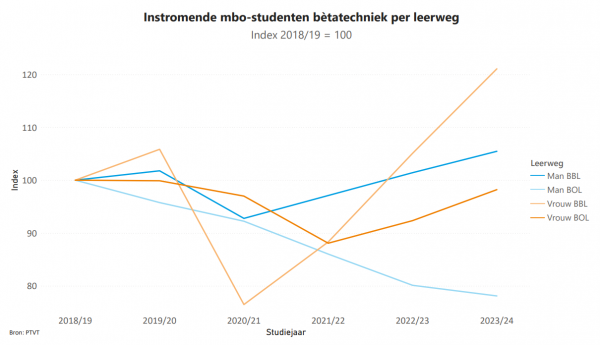There is room for everyone in technology. However, the number of women in technical professions is still low. Fortunately, things are changing. More and more women are opting for a technical MBO education via the work-based learning pathway (BBL). With most BBL courses, this means that you usually go to school one day a week. The rest of the week you work at a training company. In the video below, which we made with FME, Janne Koeman and Wendy Vlaar, student and teacher of mechatronics at Talland College, talk about how they experience technology - and why this is also for women.
More women in BBL courses
It is not surprising that Janne and Wendy are so positive about technology and in particular the BBL course. The graph below shows the changes in the number of incoming MBO students in science and technology from the 2018/19 academic year. After a decline in 2020/21, the influx of female BBL students has increased sharply in recent years, so more women are opting for such a technical BBL course. A positive development: more women are finding their place in technology - and companies are benefiting from this. Mixed teams provide new insights, better cooperation and more innovation.

Recognised training companies play a key role
This development is partly due to the recognised training companies, which offer a learning-workplace for students. A BBL course can only exist if students can go to companies where they learn and work. By registering your company as a recognised training company with SBB, you give talents like Janne the opportunity to develop in practice. At the same time, you invest in your own future professionals.
Collaborating on technical talent
A good example of such an industry school is Tetrix. Tetrix offers BBL training courses in technology and works together with companies to train young people in practice to become professionals. Your company can also register with an industry school such as Tetrix. We have listed the benefits for you:
- Access to young technical talent who work directly on the work floor
- Training according to your own working method and corporate culture
- Sustainable solution for staff shortages in technology
- Guidance from the industry school in the learning process and the role as a training company
- Positive employer image by investing in the professionals of the future
Diversity crucial for successful Dutch high-tech
The Dutch high-tech industry has only 15% female employees and a low representation of people with a different cultural background. This while diversity can not only attract more talent, but also leads to innovation, success and higher employee satisfaction, which makes it important for employers to promote diversity. Want to know more about role models in technology and diversity in Human Capital?





